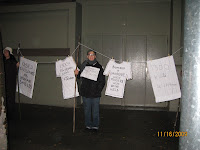There are few places where the term “family fisherman” has more meaning than here in Ballard.
Our Fishermen’s Terminal houses one of the largest commercial fleets on the West Coast and affords locals the opportunity to purchase fish right off a boat or near the docks at the Wild Seafood Exchange.
Unfortunately, there are also few places where the fight between anonymous, large-scale corporate ownership and small-scale family fishermen is more apparent.
Driving over the Ballard Bridge, you can witness this clear division in the industry: factory trawlers bearing the logos of large, transnational seafood companies dwarf the family fishing boats boats tied to the Terminal docks.
This physical juxtaposition of small versus large embodies the struggle currently playing out on the national stage over the privatization of our fisheries.
Fisheries privatization is not a new concept, especially in Washington, where the halibut and black cod fisheries have been privatized since 1995, and the King and Sea Snow crab fisheries have been privatized since 2004.
Although referred to by myriad of different and often confusing names (IFQs, rationalization, catch shares, etc.), at its core privatization takes our federal fisheries (a public trust resource) and gives away the right to fish them, for free, to the entities that caught the most fish in the past.
Some of the time this system rewards talented and experienced fishermen; more of the time it rewards the big boats who fished the hardest, the fastest and often the least-sustainably – the same big boats that are anchored in the well-traveled channel between Lake Union and Puget Sound.
Ultimately, privatization leads to consolidation of fishing fleets and the effects are felt throughout the fishing industry.
In 2002, the Fishermen’s Terminal was opened to pleasure boats because there were not enough commercial vessels to fill the spaces. Nearby ports like Edmonds and Everett underwent a more drastic transformation, and their traditional commercial fleet has essentially vanished.
When the Alaska King and Sea Snow crab fisheries were privatized, the biggest winners were industry giants Trident Seafoods and Peter Pan Seafoods, who received a combined 40 percent of the total quota.
And the biggest losers? The nearly 1,000 fishermen whose jobs were eliminated in course of a year as ownership of the crab industry was consolidated in the hands of a powerful few.
This past summer, another stronghold of Washington’s fishing industry, the Pacific Groundfish fishery, was also privatized.
The proposed changes are expected to reduce the commercial fleet from 150 boats to around 50. They will eliminate an estimated 500 jobs, reducing the fleet to only the largest, most “efficient” trawlers.
At the heart of this conflict between Washington’s traditional fishing communities and the large corporations that have come to dominate the industry, are both the values we hold as a community and the more pragmatic question of keeping local fishermen – and the communities that depend on them – economically vital.
Independent fishermen have relied on generations of accumulated experience and local knowledge to bring fresh, high-quality and locally caught seafood to our dinner tables.
Their work also supports many other community businesses, such as Ballard Oil, Captain’s Nautical Supplies and Ballard Brothers Burgers and Seafood.
In contrast, the larger vessels – along with their job opportunities and profits – often serve foreign interests and therefore invest less in the local economy.
For these corporations, fishing is not about a way of life but rather, in the words of Greenpeace, about "making a good rate of return on their global investment capital."
The good news is that the way we manage our fisheries is not set in stone, and that we, as concerned citizens, have the opportunity to demand accountability and reform.
Volunteers with the Fair Fish Campaign, a national effort to support family fishermen and protect our oceans, have gathered more than 700 public comment cards urging Maria Cantwell, the chairwoman of the Senate Subcommittee on Oceans, Atmosphere, Fisheries and the Coast Guard, to call for hearings on catch shares.
On Nov. 24, we will deliver those postcards to Cantwell’s federal office in downtown Seattle, setting in motion a mandate for reform that will embody both our traditional ideals and vision for a sustainable future.
Please join us and take advantage of this opportunity to have your voice heard.


















